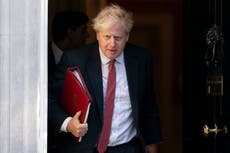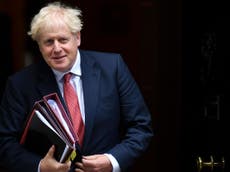State aid rules matter, but they are not the threat to British sovereignty that David Frost claims
As secretary of state, I spent a lot of time and taxpayers’ money promoting Britain’s high tech industries. There were many obstacles, but the European Commission wasn’t one of them

Your support helps us to tell the story
From reproductive rights to climate change to Big Tech, The Independent is on the ground when the story is developing. Whether it's investigating the financials of Elon Musk's pro-Trump PAC or producing our latest documentary, 'The A Word', which shines a light on the American women fighting for reproductive rights, we know how important it is to parse out the facts from the messaging.
At such a critical moment in US history, we need reporters on the ground. Your donation allows us to keep sending journalists to speak to both sides of the story.
The Independent is trusted by Americans across the entire political spectrum. And unlike many other quality news outlets, we choose not to lock Americans out of our reporting and analysis with paywalls. We believe quality journalism should be available to everyone, paid for by those who can afford it.
Your support makes all the difference.Like many Brexit ex-combatants, I switch off now when I hear all the old arguments, on both sides, being trotted out again. Punch-drunk. Bored. Resigned to a bad outcome.
But my ears pricked up when I heard that EU “state aid” rules were emerging as a key stumbling block in negotiations over a new trade deal with the EU. In particular I was baffled to hear our negotiator, Lord David Frost, claiming that because of this “infringement on our sovereignty” a newly independent Britain would be prevented from supporting the high tech industries of the future.
I was genuinely surprised. As secretary of state in BIS (Business, Innovation and Skills) for the five years of the coalition, I spent a lot of time and taxpayers’ money promoting such industries. There were many obstacles, notably the Treasury’s reluctance to spend large sums of money, but the European Commission wasn’t one of them. This must have been known to the then Mr Frost who was a senior civil servant in my department at the time (and, I recall, a perfectly competent official).
Just to recap, the following are some of the initiatives, several of which Mr Frost must have heard about in the BIS canteen, which went ahead without troubling the Spanish Commissioner for Competition Policy. First, under the Industrial Strategy, £1bn went to the aerospace industry and £500m to the car industry to support their R&D. Then I set up a network of Catapults – government-backed innovation centres – to support private sector development of core technologies. The network is still going strong as part of the work of Innovate UK.
There was the Regional Growth Fund which made equity investments in new projects in depressed, “left behind”, areas on the basis of recommendations from a business team led by Lord Heseltine. I established the British Business Bank, which incorporates venture capital funding, and the Green Investment Bank (GIB). When both were formed there was a modest delay in Brussels as they checked them out. But this was no serious problem comparable to the damage inflicted by the subsequent Conservative government, which sold the GIB to raise some cash for entirely short-term considerations.
The state aid rules mattered, but in a different way. They had been introduced largely at British insistence to stop the massive waste of government money in subsidy competition. Smart multi-national companies had become skilled at provoking bidding wars for new production lines with winners based on the size of government cheques. The rules stopped governments subsidising production costs in the car industry especially, but allowed some support for training and research. They were also an important safeguard for governments under pressure to provide open-ended subsidies to industries with chronic excess capacity like steel.
The government insists that it only wants to help the industries of the future. It is being very naïve. Once Britain is “liberated” from being a “vassal” and “client state” of Brussels, every major company in Britain will be lining up appointments at the Department of Business to explain how they are the future; but for that, in the meantime, post-Covid and post-Brexit, they need a regular slug of cash to justify staying in the UK.
Let us, however, make the heroic assumption that Boris Johnson and his colleagues can somehow acquire steel backbones and learn how to say “no” to plausible sounding delegations from employers and workers in “Red Wall” constituencies asking for subsidies to keep jobs. The issue then is how to allocate money between exciting new possibilities as opposed to unexciting but familiar old ones.
As it happens I recently met the promoter of a scientifically transformative “moonshot” project who wants £1bn from the British government to transfer his potentially world beating operation from California to the UK. It sounded great, but it doesn’t require many moonshot projects to break the budget. And who is to decide if this particular moonshot is actually going to reach the moon? Mr Cummings? Is this a good use of government money as opposed to schools and colleges or the NHS?
There are two answers and neither is incompatible with EU state aid rules. The first is to invest in the Industrial Strategy, as we did in the coalition, with industry-wide R&D. The other is to have state investment in venture capital funds, as we have had through the British Business Bank, with the fund managers rather than ministers making the actual choices. I believe Mr Sunak has been going down this road without hitting EU objections.
So what is all the fuss about, with the government running the risk of failing to reach agreement with the EU and the serious disruption which would flow? The fuss is all about symbols and principles rather than the practicalities of policy. On both sides, the negotiations are between priests rather than plumbers, about theology rather than reality. The British side is obsessed with symbols of sovereignty and the EU has its “level playing field”. In the real world, neither is an absolute.
My earlier examples show that being a vassal still allows a great deal of freedom. In the real world, also, the level playing field is bumpier than it appears. For example, the British ask a perfectly reasonable question: why should we have to play with the EU on a level playing field of state aid rules when Canada and Australia don’t have to? The simple answer is that Canada and Australia do much less trade with the EU. And virtually none in activities like integrated car production where subsidies within supply chains could make a lot of difference to competitiveness. But that is a matter of calculation rather than principle.
At this late stage in negotiations it needs one side to step back from the sheer silliness of the current battle to the death over principles which have no intrinsic value on either side. Britain has more to lose from a breakdown in negotiations. But the EU can afford to make a small concession which will make the smaller party feel a little bigger.






Join our commenting forum
Join thought-provoking conversations, follow other Independent readers and see their replies
Comments